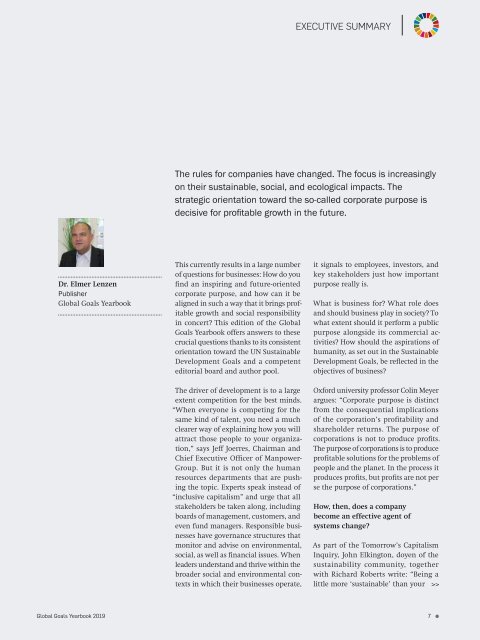Aliging Profit with Purpose - Global Goals Yearbook 2019
What are companies for? The rules for companies have changed. The focus is increasingly on their sustainable, social, and ecological impacts. The strategic orientation toward the so-called corporate purpose is decisive for profitable growth in the future. This currently results in a large number of questions for businesses: How do you find an inspiring and future-oriented corporate purpose, and how can it be aligned in such a way that it brings profitable growth and social responsibility in concert? The new 2019 edition of the Global Goals Yearbook offers answers to these crucial questions thanks to its consistent orientation toward the UN Sustainable Development Goals and a competent editorial board and author pool.
What are companies for? The rules for companies have changed. The focus is increasingly on their sustainable, social, and ecological impacts. The strategic orientation toward the so-called corporate purpose is decisive for profitable growth in the future.
This currently results in a large number of questions for businesses: How do you find an inspiring and future-oriented corporate purpose, and how can it be aligned in such a way that it brings profitable growth and social responsibility in concert? The new 2019 edition of the Global Goals Yearbook offers answers to these crucial questions thanks to its consistent orientation toward the UN Sustainable Development Goals and a competent editorial board and author pool.
You also want an ePaper? Increase the reach of your titles
YUMPU automatically turns print PDFs into web optimized ePapers that Google loves.
EXECUTIVE SUMMARY<br />
The rules for companies have changed. The focus is increasingly<br />
on their sustainable, social, and ecological impacts. The<br />
strategic orientation toward the so-called corporate purpose is<br />
decisive for profitable growth in the future.<br />
Dr. Elmer Lenzen<br />
Publisher<br />
<strong>Global</strong> <strong>Goals</strong> <strong>Yearbook</strong><br />
This currently results in a large number<br />
of questions for businesses: How do you<br />
find an inspiring and future-oriented<br />
corporate purpose, and how can it be<br />
aligned in such a way that it brings profitable<br />
growth and social responsibility<br />
in concert? This edition of the <strong>Global</strong><br />
<strong>Goals</strong> <strong>Yearbook</strong> offers answers to these<br />
crucial questions thanks to its consistent<br />
orientation toward the UN Sustainable<br />
Development <strong>Goals</strong> and a competent<br />
editorial board and author pool.<br />
The driver of development is to a large<br />
extent competition for the best minds.<br />
“When everyone is competing for the<br />
same kind of talent, you need a much<br />
clearer way of explaining how you will<br />
attract those people to your organization,”<br />
says Jeff Joerres, Chairman and<br />
Chief Executive Officer of Manpower-<br />
Group. But it is not only the human<br />
resources departments that are pushing<br />
the topic. Experts speak instead of<br />
“inclusive capitalism” and urge that all<br />
stakeholders be taken along, including<br />
boards of management, customers, and<br />
even fund managers. Responsible businesses<br />
have governance structures that<br />
monitor and advise on environmental,<br />
social, as well as financial issues. When<br />
leaders understand and thrive <strong>with</strong>in the<br />
broader social and environmental contexts<br />
in which their businesses operate,<br />
it signals to employees, investors, and<br />
key stakeholders just how important<br />
purpose really is.<br />
What is business for? What role does<br />
and should business play in society? To<br />
what extent should it perform a public<br />
purpose alongside its commercial activities?<br />
How should the aspirations of<br />
humanity, as set out in the Sustainable<br />
Development <strong>Goals</strong>, be reflected in the<br />
objectives of business?<br />
Oxford university professor Colin Meyer<br />
argues: “Corporate purpose is distinct<br />
from the consequential implications<br />
of the corporation’s profitability and<br />
shareholder returns. The purpose of<br />
corporations is not to produce profits.<br />
The purpose of corporations is to produce<br />
profitable solutions for the problems of<br />
people and the planet. In the process it<br />
produces profits, but profits are not per<br />
se the purpose of corporations.”<br />
How, then, does a company<br />
become an effective agent of<br />
systems change?<br />
As part of the Tomorrow’s Capitalism<br />
Inquiry, John Elkington, doyen of the<br />
sustainability community, together<br />
<strong>with</strong> Richard Roberts write: “Being a<br />
little more ‘sustainable’ than your >><br />
<strong>Global</strong> <strong>Goals</strong> <strong>Yearbook</strong> <strong>2019</strong><br />
7

















